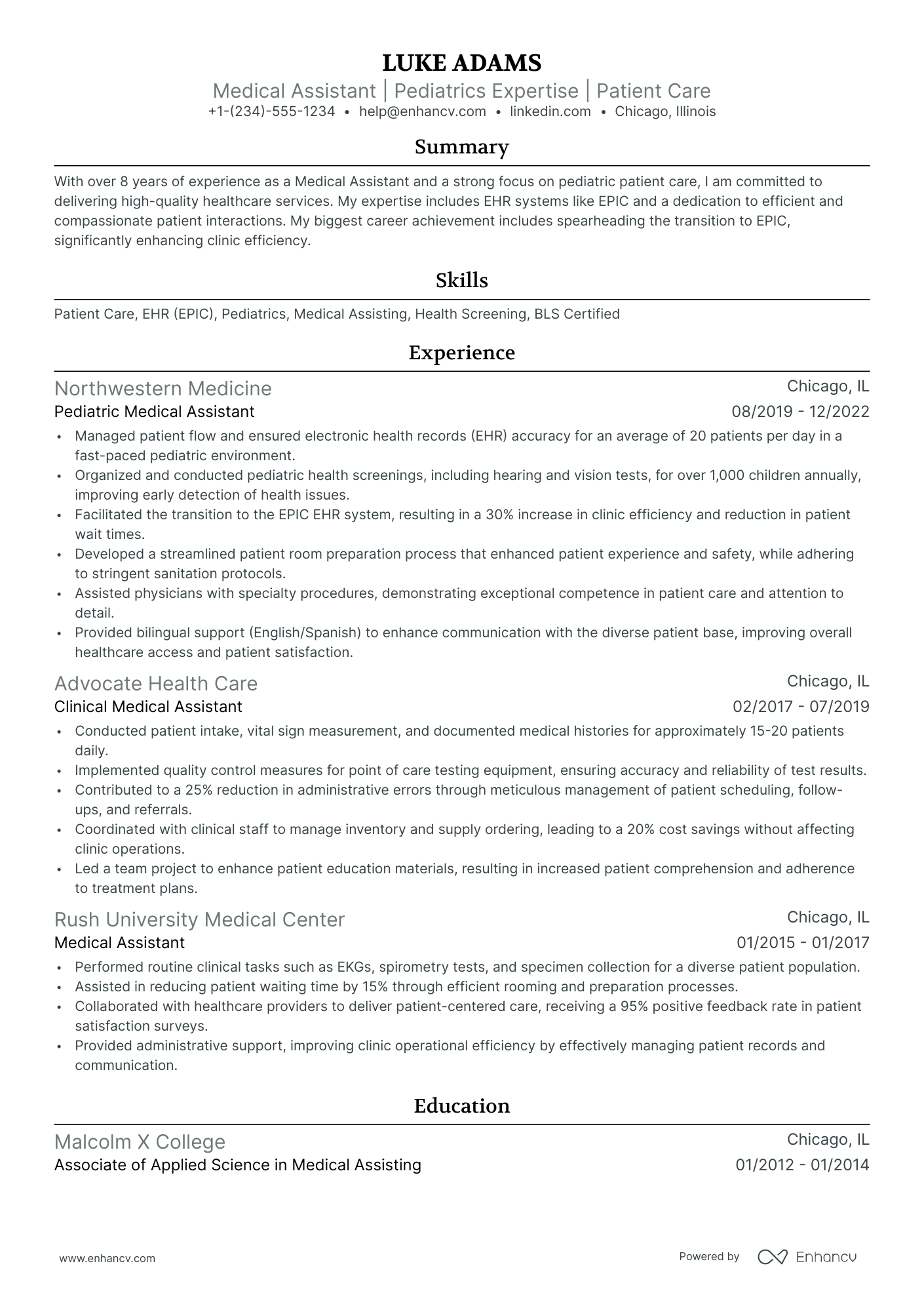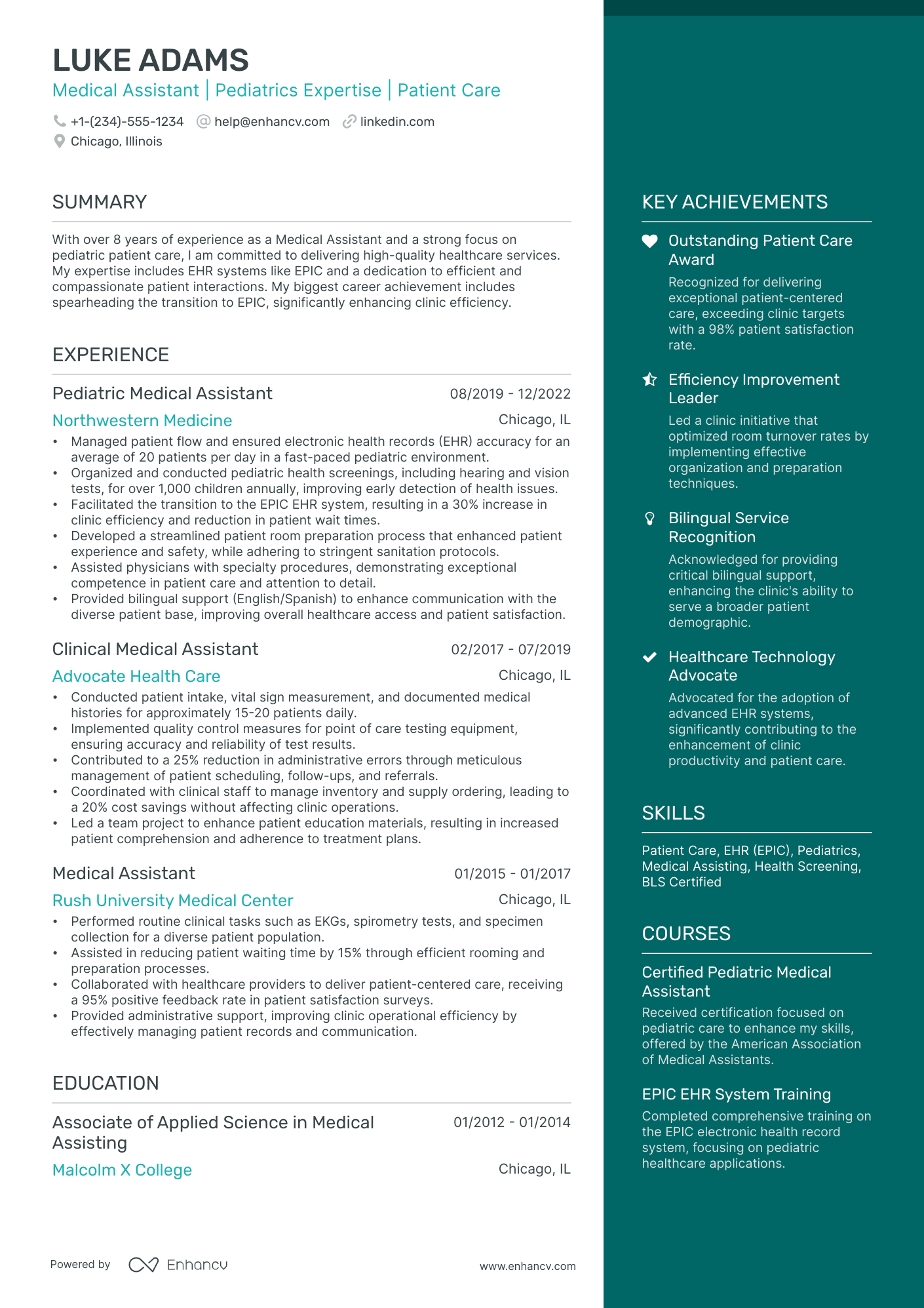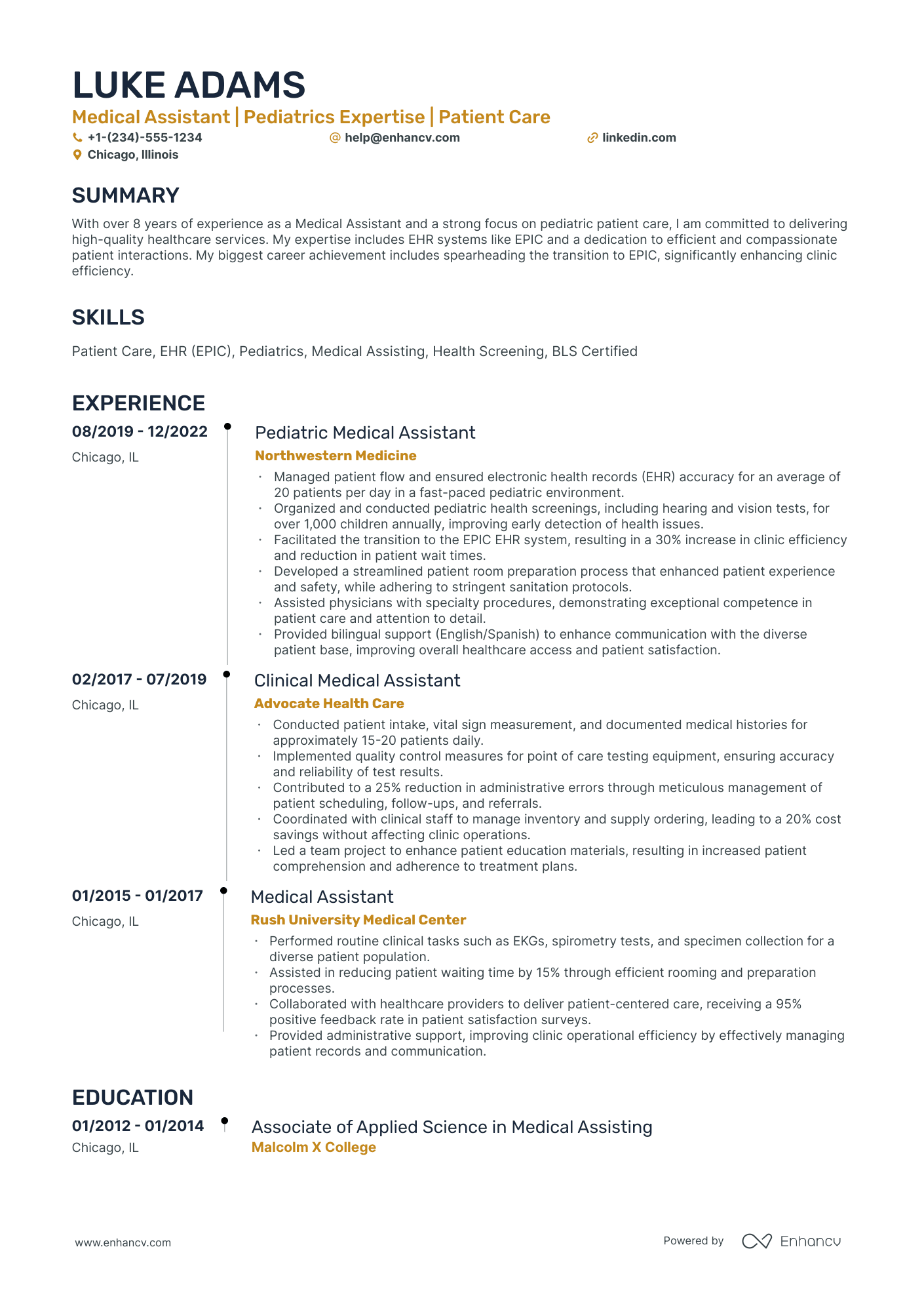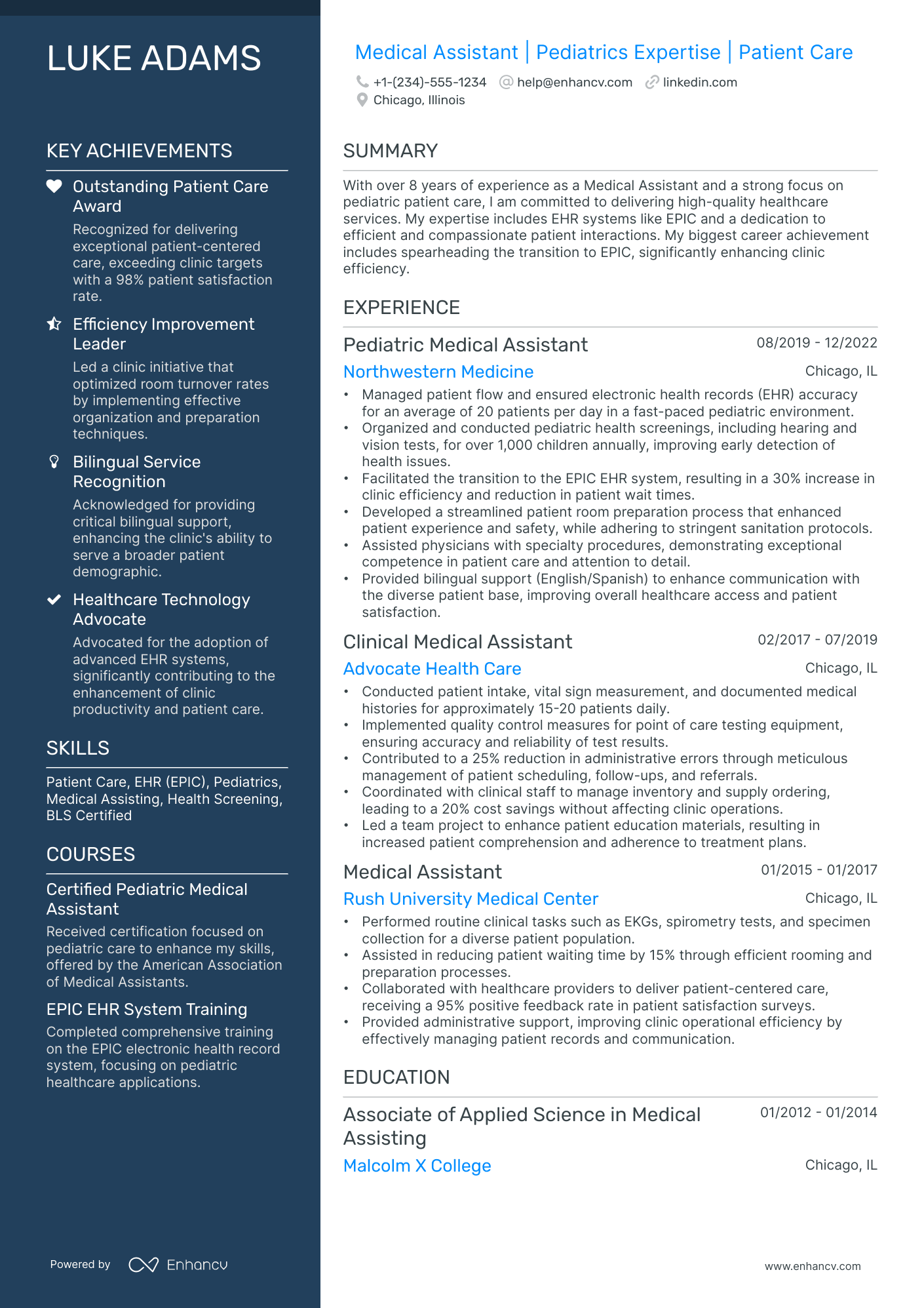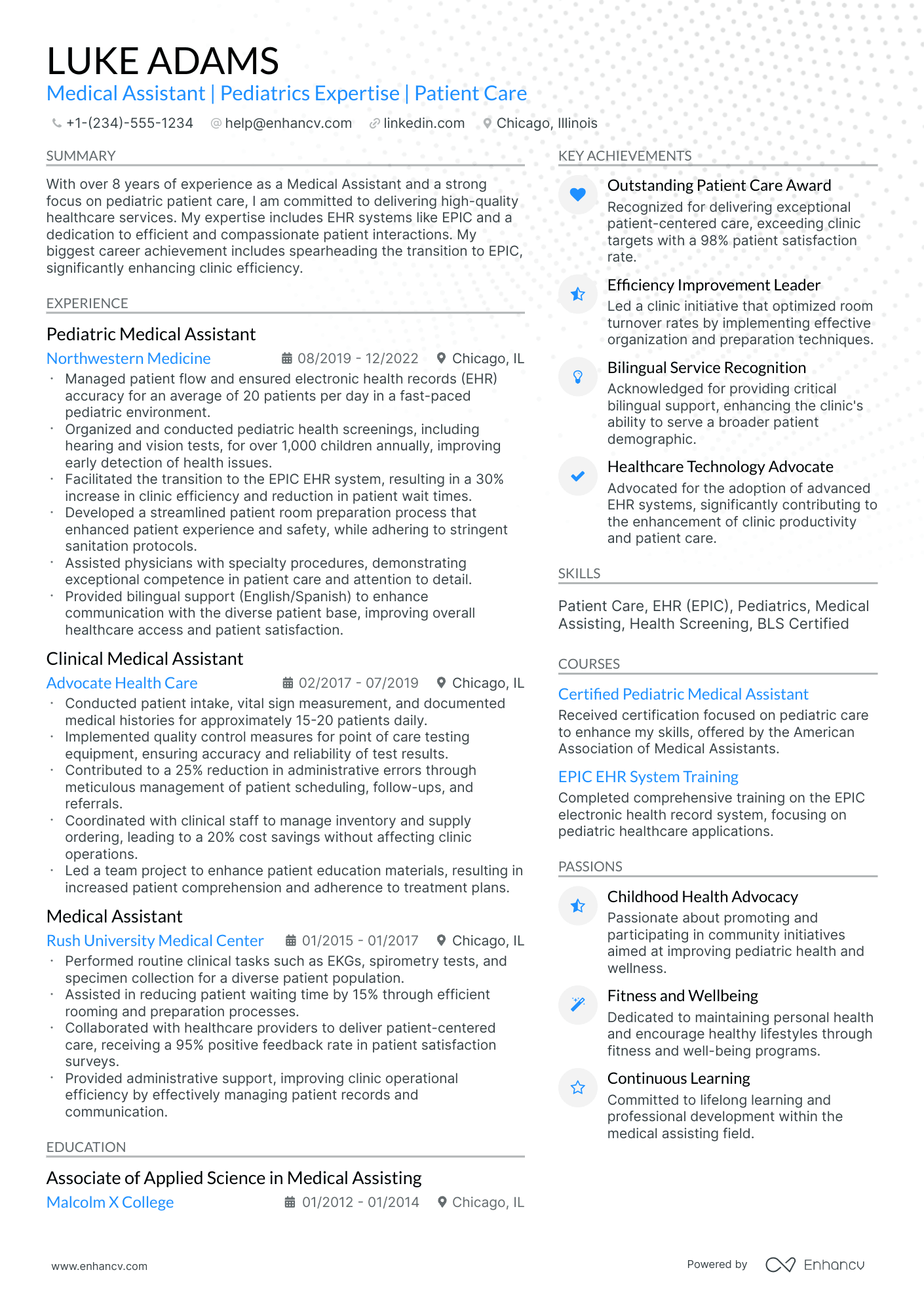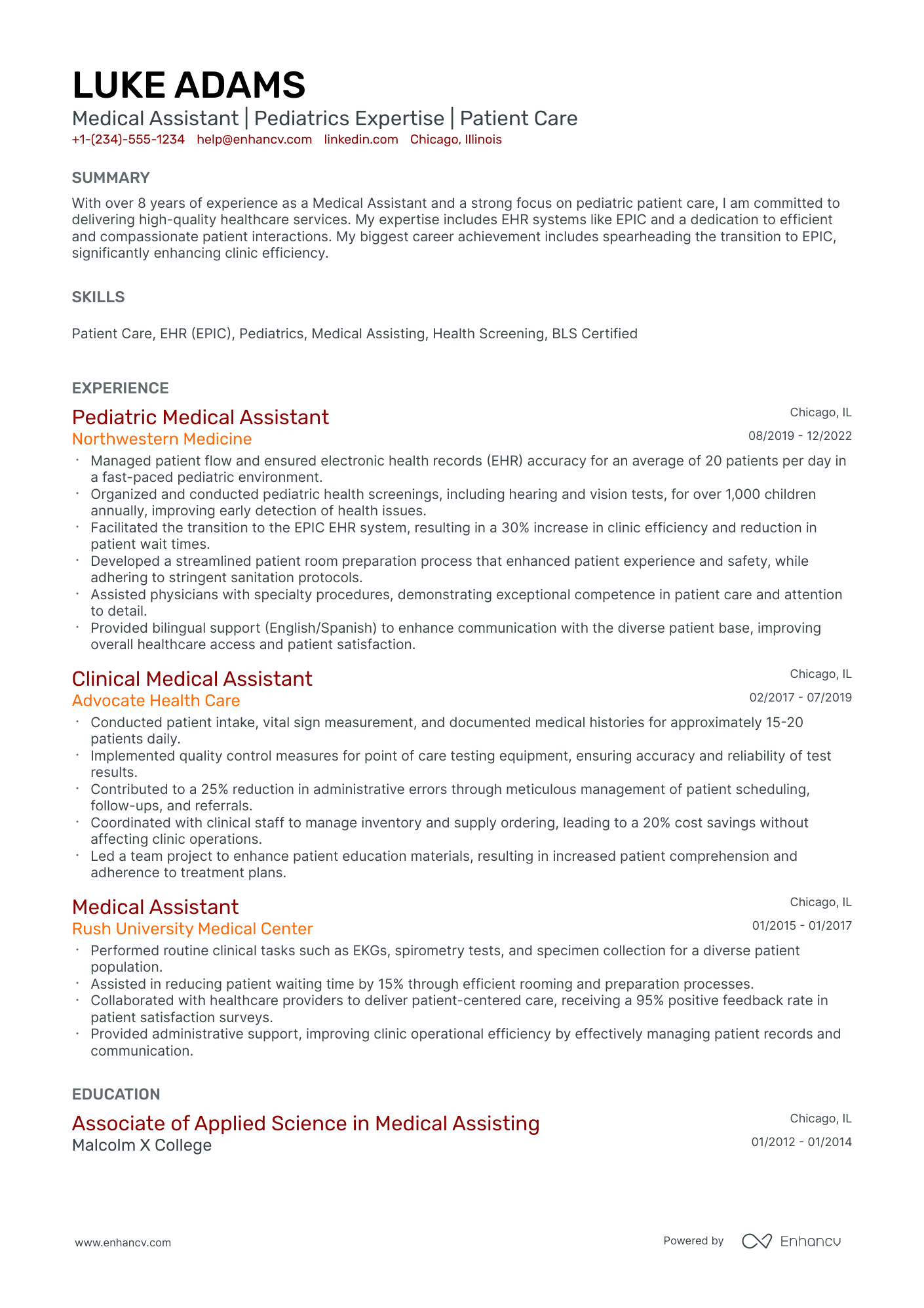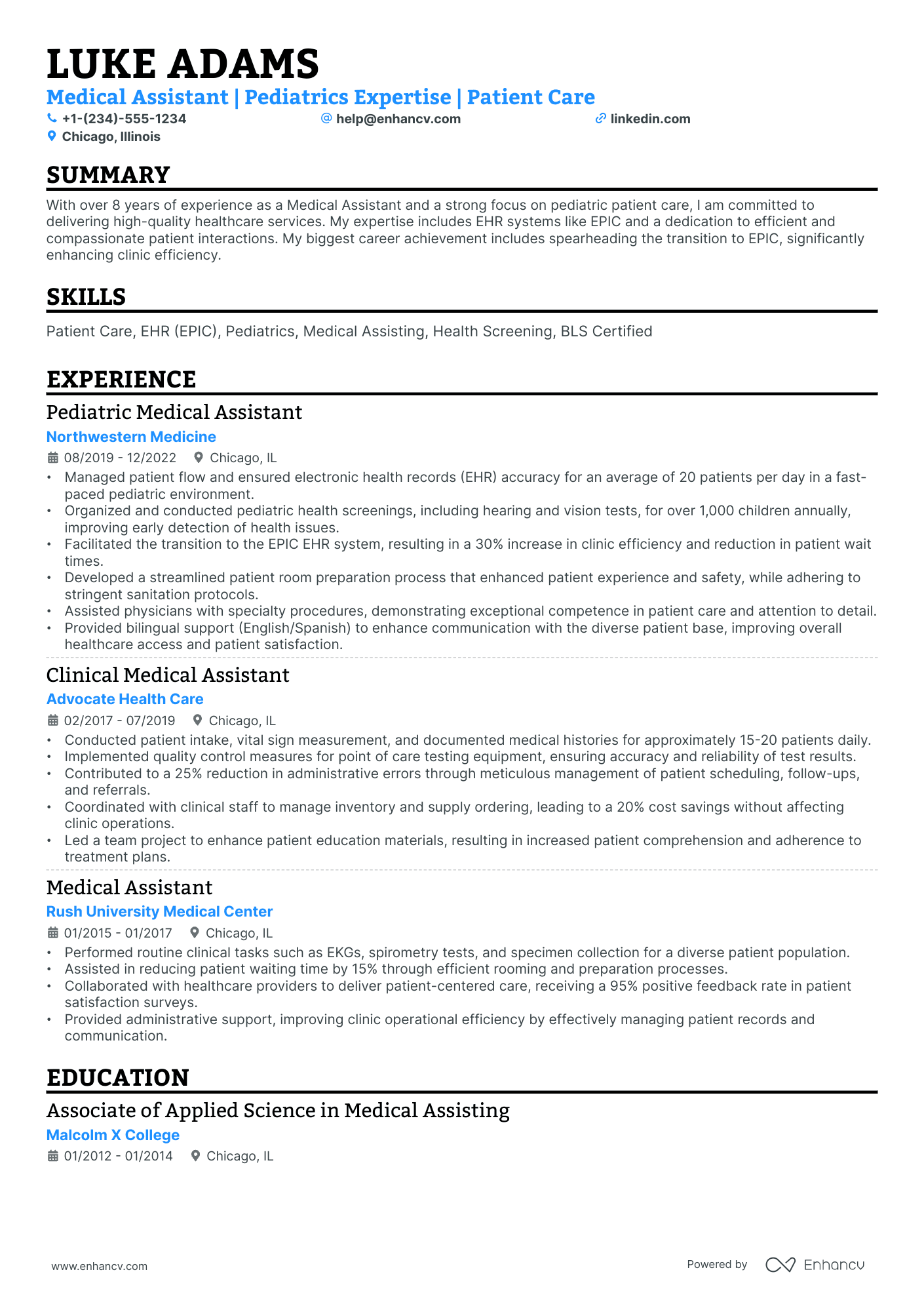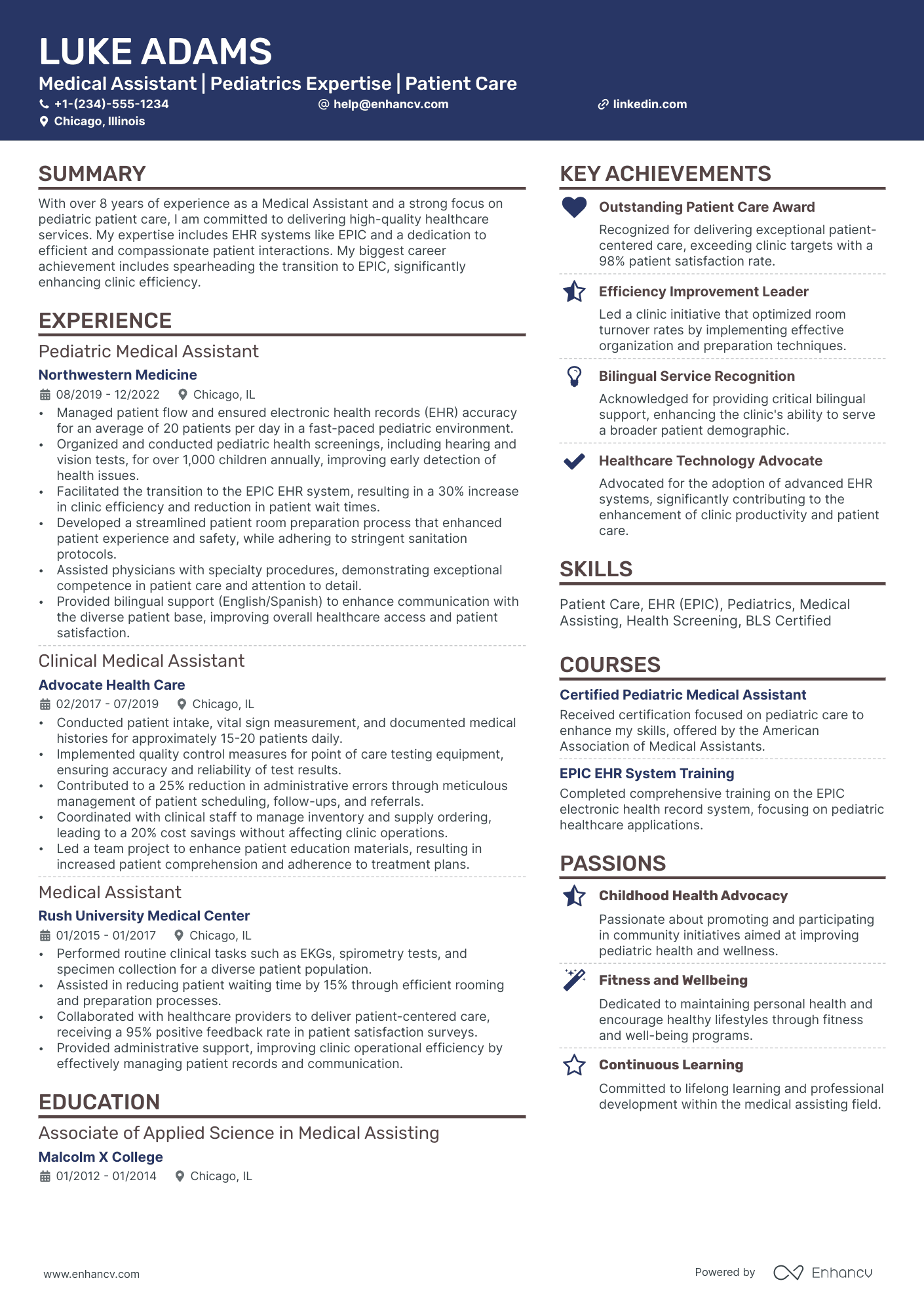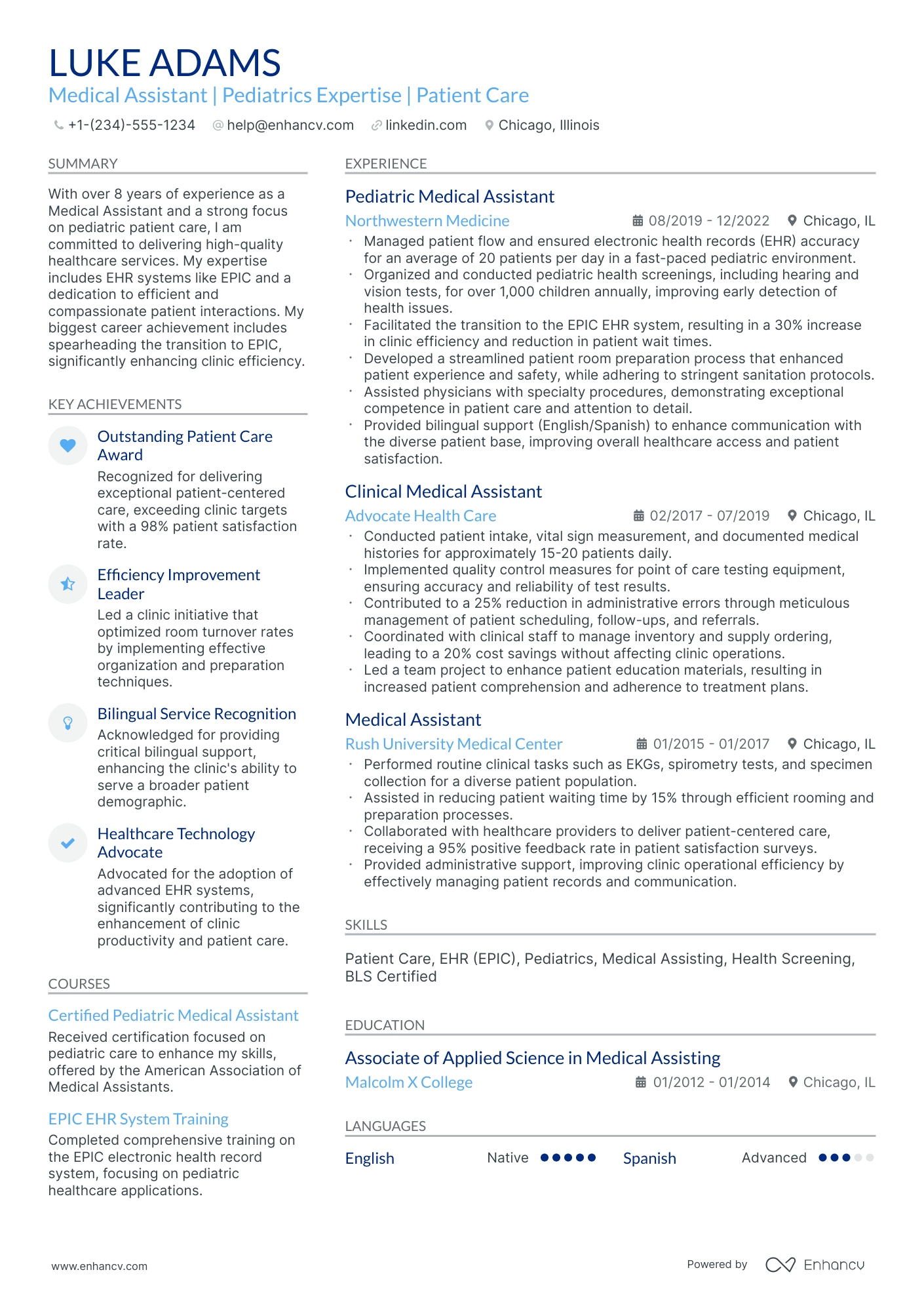As a pediatric medical assistant, you may struggle to effectively convey your extensive experience in a child-focused environment on your resume. Our guide provides expert tips and examples to help you highlight your pediatric skills and experiences, demonstrating to potential employers your unique qualifications for their team.
- Utilize real-life examples to refine your pediatric medical assistant resume;
- Effectively write the experience section of your pediatric medical assistant resume, even if you have minimal or no professional experience;
- Incorporate the industry's top 10 essential skills throughout your resume;
- Include your education and certifications to highlight your specific expertise.
If the pediatric medical assistant resume isn't the right one for you, take a look at other related guides we have:
- Dental Hygienist Resume Example
- Clinical Pharmacist Resume Example
- Phlebotomist Resume Example
- Care Manager Resume Example
- Pacu Nurse Resume Example
- Nurse Manager Resume Example
- Hemodialysis Nurse Resume Example
- Nursing Student Resume Example
- Medical Receptionist Resume Example
- Nurse Anesthetist Resume Example
Enhancing your pediatric medical assistant resume: format and layout tips
"Less is more" - this principle is key for your pediatric medical assistant resume design. It emphasizes the importance of focusing on why you're the ideal candidate. Simultaneously, it's crucial to select a resume design that is both clear and simple, ensuring your qualifications are easily readable.Four popular formatting rules (and an additional tip) are here to optimize your pediatric medical assistant resume:
- Listing experience in reverse chronological order - start with your most recent job experiences. This layout helps recruiters see your career progression and emphasizes your most relevant roles.
- Including contact details in the header - make sure your contact information is easily accessible at the top of your resume. In the header, you might also include a professional photo.
- Aligning your expertise with the job requirements - this involves adding essential sections such as experience, skills, and education that match the job you're applying for.
- Curating your expertise on a single page - if your experience spans over a decade, a two-page resume is also acceptable.
Bonus tip: Ensure your pediatric medical assistant resume is in PDF format when submitting. This format maintains the integrity of images, icons, and layout, making your resume easier to share.
Finally, concerning your resume format and the Applicant Tracker System (ATS):
- Use simple yet modern fonts like Rubik, Lato, Montserrat, etc.
- All serif and sans-serif fonts are friendly to ATS systems. Avoid script fonts that look like handwriting, however.
- Fonts such as Ariel and Times New Roman are suitable, though commonly used.
- Both single and double-column resumes can perform well with the ATS.
Upload & Check Your Resume
Drop your resume here or choose a file. PDF & DOCX only. Max 2MB file size.
PRO TIP
The more time and effort you've put into obtaining the relevant certificate, the closer to the top it should be listed. This is especially important for more senior roles and if the company you're applying for is more forward-facing.
Don't forget to include these six sections on your pediatric medical assistant resume:
- Header and summary for your contact details and to highlight your alignment with the pediatric medical assistant job you're applying for
- Experience section to get into specific technologies you're apt at using and personal skills to deliver successful results
- Skills section to further highlight how your profile matches the job requirements
- Education section to provide your academic background
- Achievements to mention any career highlights that may be impressive, or that you might have missed so far in other resume sections
What recruiters want to see on your resume:
- Proven ability to handle pediatric emergencies and perform CPR.
- Experience in administering vaccinations and explaining immunization schedules to parents.
- Skills in pediatric patient care, including vital signs monitoring and developmental milestone tracking.
- Expertise in communicating effectively with children of various ages and making them feel comfortable during medical procedures.
- Familiarity with pediatric-specific electronic health record (EHR) systems and the ability to maintain accurate medical documentation.
Advice for your pediatric medical assistant resume experience section - setting your application apart from other candidates
Your resume experience section needs to balance your tangible workplace achievements with job requirements.
The easiest way to sustain this balance between meeting candidate expectations, while standing out, is to:
- Select really impressive career highlights to detail under each experience and support those with your skills;
- Assess the job advert to define both the basic requirements (which you could answer with more junior roles) and the more advanced requirements - which could play a more prominent role through your experience section;
- Create a separate experience section, if you decide on listing irrelevant experience items. Always curate those via the people or technical skills you've attained that match the current job you're applying for;
- Don't list experience items from a decade ago - as they may no longer be relevant to the industry. That is, unless you're applying for a more senior role: where experience would go to demonstrate your character and ambitions;
- Define how your role has helped make the team, department, or company better. Support this with your skill set and the initial challenge you were able to solve.
Take a look at how real-life pediatric medical assistant professionals have presented their resume experience section - always aiming to demonstrate their success.
- Skillfully managed initial patient assessments, including taking vital signs and recording medical history for an average of 30 patients per day, optimizing clinic workflow.
- Implemented a patient education initiative on pediatric health, which led to a 40% increase in parent satisfaction according to yearly survey feedback.
- Orchestrated the transition to a new electronic health records system, training a team of 5 and reducing average documentation time by 25%.
- Conducted routine laboratory procedures, including phlebotomy and urinalysis, averaging 50 tests weekly with 98% accuracy.
- Enhanced the preventive care program by developing patient-friendly educational materials, reaching 200+ families within the practice.
- Played a key role in a vaccination drive that increased patient compliance with CDC pediatric vaccination schedules by 35% over two years.
- Closely collaborated with pediatricians in managing care for children with chronic conditions, resulting in a 20% improvement in follow-up adherence.
- Led a cross-functional initiative to redesign the patient check-in process, cutting wait times by an average of 15 minutes per patient.
- Successfully managed inventory of medical supplies for the pediatric unit, reducing waste and saving the practice approximately $5,000 annually.
- Assisted with minor procedures in a high-volume pediatric practice, contributing to a 10% increase in the number of patients seen daily.
- Streamlined the patient flow by introducing an appointment confirmation system, which reduced no-shows by 18% within the first year.
- Led the effort to obtain Patient-Centered Medical Home (PCMH) recognition, which improved patient outcomes and satisfaction.
- Facilitated well-child visits for over 1,500 children, ensuring comprehensive growth tracking and developmental screenings.
- Spearheaded a program for adolescent health education that reached over 100 teens, equipping them with vital health knowledge.
- Coordinated with a team of 4 to maintain a clean and organized clinical environment, passing all health inspections with zero deficiencies.
- Championed a digital patient intake system resulting in a 30% reduction in administrative time per patient and enhancing patient experience.
- Trained and supervised new hires and interns, ensuring high levels of patient care and clinical efficiency were maintained.
- Regularly communicated with patients' families to coordinate ongoing treatment plans, demonstrating excellent patient relations and adherence to clinic protocol.
- Coordinated with specialists in developing personalized care plans for pediatric patients, significantly reducing readmission rates by 15%.
- Developed and managed a well-received immunization registry to ensure timely vaccinations for all pediatric patients in the practice.
- Efficiently triaged pediatric patient phone calls, often managing over 30 calls per day, and provided accurate, compassionate advice to parents.
- Cultivated a supportive and informative atmosphere for families, contributing to a clinic award for outstanding customer service in 2023.
- Devised and implemented a pediatric obesity prevention program that contributed to a healthier BMI average among clinic patients over two years.
- Maintained a stock control system for clinical supplies that led to a 20% reduction in overstock and expired materials.
The following content includes information from "O*NET OnLine" by the U.S. Department of Labor, Employment and Training Administration (USDOL/ETA). Used under the CC BY 4.0 license. The data represents the top responsibilities present on the task lists for pediatric medical assistant professionals.
Top Responsibilities for Pediatric Medical Assistant:
- Interview patients to obtain medical information and measure their vital signs, weight, and height.
- Clean and sterilize instruments and dispose of contaminated supplies.
- Record patients' medical history, vital statistics, or information such as test results in medical records.
- Explain treatment procedures, medications, diets, or physicians' instructions to patients.
- Prepare treatment rooms for patient examinations, keeping the rooms neat and clean.
- Collect blood, tissue, or other laboratory specimens, log the specimens, and prepare them for testing.
- Help physicians examine and treat patients, handing them instruments or materials or performing such tasks as giving injections or removing sutures.
- Perform routine laboratory tests and sample analyses.
- Perform general office duties, such as answering telephones, taking dictation, or completing insurance forms.
- Prepare and administer medications as directed by a physician.
Quantifying impact on your resume
- Highlight the number of pediatric patients assisted daily to demonstrate proficiency in managing high patient volumes.
- Specify the percentage of increased patient satisfaction scores through your bedside manner and care techniques.
- Document the exact number of immunizations administered to showcase expertise in vaccination protocols.
- Measure the efficiency improvements in administrative tasks, such as reducing patient check-in time by a certain percentage.
- Include the number of pediatric health workshops conducted to emphasize education and community health leadership.
- Report any decrease in patient wait times attributed to workflow optimizations you helped implement.
- Present the volume of medical records accurately updated and managed to prove attention to detail and organizational skills.
- Indicate the number of hours spent in continuing education focused on pediatric care to display commitment to professional growth.
Action verbs for your pediatric medical assistant resume
What if you don't have any experience?
There are two very common scenarios about candidates with less experience. They are either:
- Fresh out of college in search of a pediatric medical assistant role
- Transferring over from a completely different field
Both of these types of candidates still have a shot at landing their first job in the industry.
All they need to do about the experience section of their pediatric medical assistant resume is:
- Consider their strengths - would the outcomes of their previous roles or niche skill sets impress recruiters? Feature those towards the top of your resume
- Exclude any and all irrelevant experience items - remember that at the end of the day, you're telling a story that aims to align with the ideal candidate for the pediatric medical assistant job
- Win recruiters over with personality - perhaps your ambition, dreams, and diligence would make you the perfect fit for the pediatric medical assistant role. Dedicate resume space to detail your personality traits by showcasing how they've helped you succeed in past roles
- Tailor your experience to specific job requirements - ensure your pediatric medical assistant resume answers the advert in the best way possible.
Recommended reads:
PRO TIP
Bold the names of educational institutions and certifying bodies for emphasis.
Pediatric medical assistant resume skills section: writing about your hard skills and soft skills
Recruiters always care about the skill set you'd bring about to the pediatric medical assistant role. That's why it's a good idea to curate yours wisely, integrating both hard (or technical) and soft skills. Hard skills are the technology and software you're apt at using - these show your suitability for the technical aspect of the role. They are easy to track via your experience, certifications, and various resume sections. Your soft skills are those personality traits you've gained over time that show how you'd perform in the specific team, etc. Soft skills are more difficult to qualify but are definitely worth it - as they make you stand out and show your adaptability to new environments. How do you build the skills section of your resume? Best practices point that you could:
- Include up to five or six skills in the section as keywords to align with the advert.
- Create a specific technical skills section to highlight your hard skills aptitude.
- Align the culture of the company you're applying to with your soft skills to determine which ones should be more prominent in your skills section.
- Make sure you answer majority of the job requirements that are in the advert within your skills section.
A pediatric medical assistant's resume requires a specific skill set that balances both industry-specific hard skills with personal, soft skills. Discover the perfect mix for the pediatric medical assistant role from our list:
Top skills for your pediatric medical assistant resume:
Electronic Health Records (EHR) Management
Patient Scheduling Software
Medical Billing and Coding
Vital Signs Measurement
Phlebotomy
Injections Administration
Medical Equipment Operation
Immunization Tracking Systems
Laboratory Specimen Handling
Basic First Aid and CPR
Communication
Empathy
Attention to Detail
Time Management
Team Collaboration
Problem-Solving
Adaptability
Patience
Organizational Skills
Active Listening
Next, you will find information on the top technologies for pediatric medical assistant professonals from "O*NET OnLine" by the U.S. Department of Labor, Employment and Training Administration (USDOL/ETA). Used under the CC BY 4.0 license.
Top technologies for Pediatric Medical Assistant’s resume:
- eClinicalWorks EHR software
- Epic Systems
- Microsoft PowerPoint
- Email software
- Microsoft Outlook
PRO TIP
Highlight any significant extracurricular activities that demonstrate valuable skills or leadership.
How to include your education and certifications on your resume
We're taking you back to your college days with this part of our guide, but including your relevant higher education is quite important for your resume.
Your degree shows recruiters your dedication to the industry, your recent and relevant know-how, and some form of experience in the field.
Your pediatric medical assistant resume education should:
- Include your applicable degrees, college (-s) you've graduated from, as well as start and end dates of your higher education;
- Skip your high school diploma. If you still haven't graduated with your degree, list that your higher education isongoing;
- Feature any postgraduate diplomas in your resume header or summary - this is the perfect space to spotlight your relevant MBA degree;
- Showcase any relevant coursework, if you happen to have less professional experience and think this would support your case in being the best candidate for the role.
As far as your job-specific certificates are concerned - choose up to several of the most recent ones that match the job profile, and include them in a dedicated section.
We've saved you some time by selecting the most prominent industry certificates below.
The top 5 certifications for your pediatric medical assistant resume:
- Certified Clinical Medical Assistant (CCMA) - National Healthcareer Association (NHA)
- Registered Medical Assistant (RMA) - American Medical Technologists (AMT)
- Certified Medical Administrative Assistant (CMAA) - National Healthcareer Association (NHA)
- Registered Clinical Medical Assistant (RCMA) - American Medical Certification Association (AMCA)
- Pediatric Advanced Life Support (PALS) - American Heart Association (AHA)
The content below includes information from "O*NET OnLine" by the U.S. Department of Labor, Employment and Training Administration (USDOL/ETA). Used under the CC BY 4.0 license. The data represents the top associations for pediatric medical assistant professionals.
Top US associations for a Pediatric Medical Assistant professional
- Accrediting Bureau of Health Education Schools
- American Association of Medical Assistants
- American Heart Association
- American Medical Technologists
- American Optometric Association
PRO TIP
Highlight any significant extracurricular activities that demonstrate valuable skills or leadership.
Recommended reads:
The summary or objective: focusing on the top one-third of your resume
It's a well-known fact that the top one-third of your pediatric medical assistant resume is the make-it-or-break-it moment of your application. The resume summary and objective could help you further build up your professional profile.
- If you have plenty of career highlights behind your back, use the resume summary . The pediatric medical assistant summary immediately focuses recruiters' attention on what matters most within your experience.
- The resume objective is the perfect choice for balancing your career achievements with your vision. Use it to state precisely how you see yourself in a couple of years' time - as part of the company you're applying for.
Both the resume summary and resume objective can be your value pitch to potential employers: answering what makes your application unique and the top choice for the pediatric medical assistant role. They both have to be specific and tailored - as there's no one-size-fits-all approach to writing your pediatric medical assistant summary or objective. Use the pediatric medical assistant examples below as a starting point:
Resume summaries for a pediatric medical assistant job
- With a robust experience spanning over 12 years as a pediatric medical assistant at a high-volume clinic, I bring a comprehensive skill set including expert patient care, vaccine administration, and meticulous health record management. Noteworthy achievement: Successfully implemented an efficient patient flow system reducing wait times by 25%.
- Dedicated former elementary teacher, with a 10-year tenure, transitioning to pediatric medical assistance, eager to leverage expertise in child development, compassionate communication, and educational assessment to provide exceptional support in a pediatric healthcare setting.
- Accomplished medical laboratory technician with 8 years of experience in diagnostic testing seeking to pivot into pediatric care, bringing precision in data collection and analysis, strong attention to detail, and proven ability to work effectively under pressure in fast-paced environments.
- Eager to transition from a 5-year career in children’s social work to pediatric medical assistance, I have a unique perspective on child welfare and family dynamics, along with honed interpersonal skills to foster a supportive and empathetic medical environment for young patients.
- Seeking a foundation for a career in pediatric healthcare as a medical assistant, I am driven to apply my recent certification and knowledge in clinical procedures, patient education, and medical terminology from an accredited medical assistant program to deliver high-quality care.
- Aiming to embark on a lifelong journey in the pediatric medical field, I bring enthusiasm for learning hands-on clinical skills, a commitment to acquiring proficiency in administrative duties, and a genuine passion for contributing to the health and wellness of children.
Average salary info by state in the US for Pediatric Medical Assistant professionals
Local salary info for Pediatric Medical Assistant.” Source: My Next Move, National Center for O*NET Development. Accessed 10/15/2024
| State | Average Salary (in USD) |
|---|---|
| US National Average | $42,000 |
| California (CA) | $46,690 |
| Texas (TX) | $37,570 |
| Florida (FL) | $38,340 |
| New York (NY) | $45,440 |
| Pennsylvania (PA) | $39,480 |
| Illinois (IL) | $42,850 |
| Ohio (OH) | $38,280 |
| Georgia (GA) | $38,060 |
| North Carolina (NC) | $40,190 |
| Michigan (MI) | $38,300 |
Extra pediatric medical assistant resume sections and elements
Creating a winning pediatric medical assistant resume isn't about following a rigid formula. The key is to tailor it to the job requirements while maintaining your unique personality.
Consider including these additional resume sections to enhance your profile:
- Awards - Highlight industry-specific awards as well as any personal accolades to demonstrate recognition of your expertise and achievements;
- Hobbies and interests - Share your interests outside of work. This can provide insights into your personality and indicate whether you'd be a good cultural fit for the organization;
- Projects - Detail significant projects you've been involved in, focusing on your contributions and the outcomes;
- Publications - If you've authored or co-authored academic papers or other publications, include them to establish your credibility and in-depth knowledge of the field.
These sections can give a more comprehensive view of your capabilities and character, complementing the standard resume content.
Key takeaways
- Your resume layout plays an important role in presenting your key information in a systematic, strategic manner;
- Use all key resume sections (summary or objective; experience; skills; education and certification) to ensure you’ve shown to recruiters just how your expertise aligns with the role and why you're the best candidate;
- Be specific about listing a particular skill or responsibility you've had by detailing how this has helped the role or organization grow;
- Your personality should shine through your resume via the interests or hobbies, and strengths or accomplishments skills sections;
- Certifications go to provide further accreditation to your technical capabilities, so make sure you've included them within your resume.
